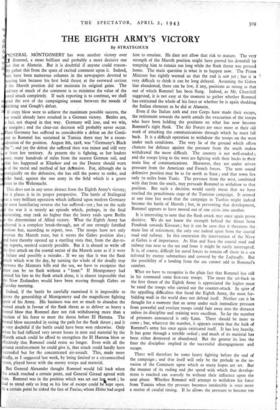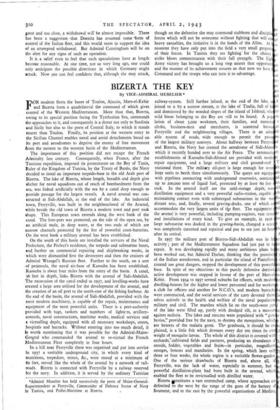THE EIGHTH ARMY'S VICTORY
By STRATEGICUS
GENERAL MONTGOMERY has won another victory over Rommel, a more brilliant and probably a more decisive one San that at Alamein. But it is doubtful if anyone could reason- IN, gather this from the spate.of excited comment upon it. Indeed,
ere have been numerous columns in the newspapers devoted to scusing him because his first bold thrust at the eastward section f the Mareth position did not maintain its original gains. The ndency of much of the comment is to minimise the value of the ontal attack completely. If such reporting is to continue, we shall
et
tt
o pond the rest of the campaigning season between the moods of ul lafeking and Gough's defeat.
If every blow were to achieve the maximum possible success, the .ar would already have resulted in a German victory. Battles are, fact, not shaped in that way. Germany will lose, and we win, N margins ; and the clear-cut decision will probably never occur.
n When Germany has suffered as considerable a defeat on the Conti- cnt as Rommel has sustained in Tunisia there may be a recon- deration of the position. August 8th, 1918, was ",Germany's Black )1 ay "; and yet the defeat she suffered then was minor and still very ar from her territory. At present she is fighting, as her • leaders oast, many hundreds of miles from the nearest German soil, and .hat has happened at Kharkov and on the Donetz should warn n s of the metal and method of her defensive. For, although she is trategically on the defensive, she has still the power to strike, and trike hard, against the one army in the field which is a grave Treat to the Wehrmacht.
This does not in any sense detract from the Eighth Army's victory; ut it places it in its proper perspective. The battle of Stalingrad is a very brilliant operation which inflicted upon modern Germany he most humiliating reverse she has suffered—yet ; but on the scale the war it is merely an episode which, perhaps, in the final ..counting, may rank no higher than the heavy raids upon Berlin s the determinant of Allied victory. What the Eighth Army has thieved is a complete break-through, not of one strongly fortified osition but, according to report, two. The troops have net only werrun the Mareth zone, but it seems the Gabes position also ; nd have thereby opened up a startling vista that, from the day-to- ay reports, seemed scarcely possible. But it is absurd to write off he first attack on the coastal sector of the Mareth zone as if it were failure and possibly a mistake.. If we say that it was the flank tack which won the day, by turning the m hole of the deadly trap etween the Matmata hills and the sea, we have to recognise that here can be no flank without a " front." If Montgomery had inned his fate to the flank attack alone, it is almost impossible that he New Zealanders would have been moving through Gabes on uesday morning.
Indeed, if the battle be carefully examined it is impossible to snore the generalship of Montgomery and the magnificent fighting pirit of his Army. His business was not so much to abandon the rontal attack in favour of the flank threat as to deliver so heavy a rontal blow that Rommel dare not risk withdrawing more than a raction of his force to meet the threat before El Hamma. The rontal blow succeeded in easing the path for the flank thrust ; and it s very doubtful if the battle could have been won otherwise. Only hen he had inflicted very severe losses in men and material by the iareth attack could he afford to strengthen the El Hamma blow so ffectively that Rommel could resist no longer. Even with all the round reinforcement he could give it, that attack could hardly have ucceeded but for the concentrated air-assault. This, made more eadly, as I suggested last week, by being limited to a circumscribed space, played havoc with the enemy troops and material.
But General Alexander thought Rommel would fall back when the attack reached a certain point, and General Giraud agreed with him. Rommel was in the position which was set out lag, week ; he had to stand only so long as his line of escape could be"kept open. At a certain point he risked the fate of Paulus, whom Hitler had urged
IC
tt
him to emulate. He dare not allow that risk to mature. The very strength of the Mareth position might have proved his downfall by tempting him to remain too long while the flank threat was pressed home. The main question is what is to happen now. The Prima Minister has rightly warned us that the end is not yet ; but it is very difficult to think it can be long delayed. Assuming the Gabes line abandoned, there can be few, if any, positions as strong as that out of which Rommel has been flung. Indeed, as Mr. Churchill suggested, it is not easy at the moment to gather whether Rommel has extricated the whole of his force or whether he is again shedding the Italian elements as he did at Alamein.
Even if the Italian loth and 21SI Corps have made their escape, the retirement towards the north entails the evacuation of the troops who have been holding the positions on what has now become Rommel's right flank. The Air Forces are once more at their old work of attacking the communications through which he must fall back. It is a difficult operation to withdraw the troops on the west under such conditions. The very lie of the ground which offers chances for defence against the pressure from the south makes withdrawal the more difficult. The country is not well-roaded ; and the troops lying to the west are fighting with their backs to their main line of communications. Moreover, they are under severe pressure from the American and French forces. The next sound defensive position may be as far north as Susa ; and that town lies only 70 miles from Tunis. The pressure from the west, combined with that from the south, may persuade Rommel to withdraw to that position. But such a decision would surely mean that we have reached the penultimate stage of the Tunisian campaign. It seemed at one time last week that the campaign in Tunisia might indeed become the battle of Mareth ; but, in preventing that development, Rommel appears to have moved out of one crisis into another.
It is interesting to note that the flank attack may once again prove decisive. We do not know the strength behind the thrust from Fondouk towards Kirouan ; but it can be seen that it threatens the main line of retirement, the only one indeed apart from the coastal road and railway. In this connexion the intervention of the Navy at Gabes is of importance. As Sfax and Susa the coastal road and railway run near to the sea and from it might be easily interrupted. It is, of course, difficult for naval forces to remain off shore in a sea ir.fested by enemy submarines and covered by the Luftwaffe. But the possibility of a landing from the sea cannot add to Rommel's comfort.
What we have to recognise is the plain fact that Rommel has still in his command some first-rate troops. The more the set-back to the first thrust of the Eighth Army is appreciated the higher must be rated the troops who carried out the counter-attack. In spite of the appalling difficulties that faced the Eighth Army, the most for- bidding wadi in the world does not defend itself. Neither can it be thought for a moment that an army under such immediate pressure from powerful and resolute troops could fade away into the distance unless its discipline and training were excellent. So far the number of prisoners announced is only 8,000. There should be more to come ; but, whatever the number, it appears certain that the bulk of Rommel's army has once again extricated itself. It has lost heavily. It has gone through a terrible ordeal ; and much of its material has been either destroyed or abandoned. But the greater its loss the finer the discipline implied in the successful disengagement and escape.
There will therefore be some heavy fighting before the end of the campaign ; and that itself will only be the prelude to the in- vasion of the Continent upon which so many hopes arc set. But the manner of its ending and .the speed with which that develop- ment is reached can scarcely be without their influence upon the next phase. Whether Rommel will attempt to withdraw his force from Tunisia when the pressure becomes intolerable is once more a matter of careful timing. If he allows the pressure to become too great and too close, a withdrawal will be almost impossible. There has been a suggestion that Doenitz has assumed some 'form of control of the Italian fleet, and this would seem to support the idea of an attempted withdrawal. But Admiral Cunningham will be on the alert for any signs of such an operation.
It is a relief even to feel that such speculations have at length become reasonable. At one time, not so very long ago, one could only anticipate the possible directions in which Germany might attack. Now one can feel confident that, although she may attack, though on the defensive she may command stubborn and discipl forces which will not be overcome without fighting that will heavy casualties, the initiative is in the hands of the Allies. At moment they have only put into the field a very small proport of their forces. In Tunisia they are fighting' for the chance strike blows commensurate with their full strength. The Ei Army victory has brought us a long step nearer that opportun and the manner of its achievement assures us that now we have Command and the troops who can turn it to advantage.



























 Previous page
Previous page